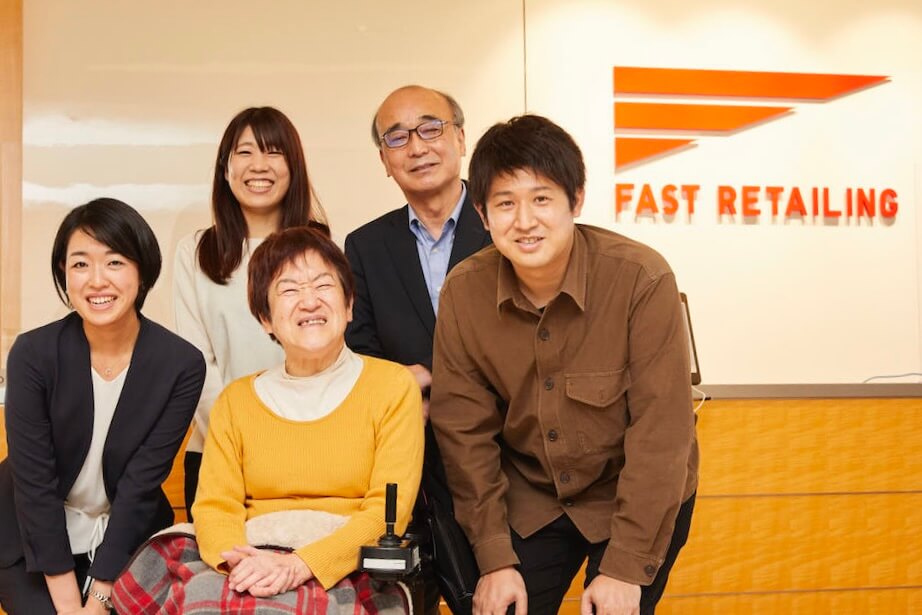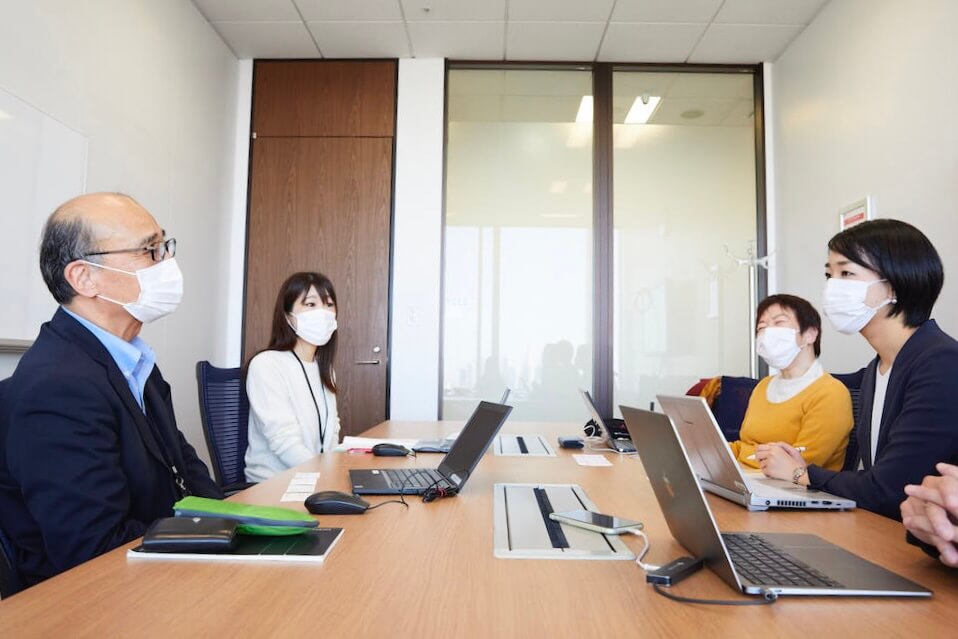【TNF Journal】Business’s New Relationship with Disabilities(Part 19)Aiming to Hire at Least One Person with a Disability at Every Store, Fast Retailing Is Creating Workplaces that Benefit from Characteristics of Disabilities

Key Points in this Article
- At UNIQLO and GU retail stores, Fast Retailing is working to create an environment where people with disabilities can be employed and work with a sense of fulfillment. It aims to hire at least one person with a disability at each store.
- Fast Retailing will establish a career follow up system and make positive use of disability characteristics while respecting the will of the individuals concerned.
- Fast Retailing is promoting an understanding of persons with disabilities within the company, and is cooperating with employment support organizations to create a work environment where persons with disabilities can work stably.
Reporting: The Nippon Foundation Journal Editing Department
Fast Retailing Co., Ltd. (external link)—parent company of such global brands as UNIQLO, GU, and Theory—has adopted the following as its corporate statement: Changing clothes. Changing conventional wisdom. Changing the world. Declaring its goal to hire at least one person with a disability in each of its stores, Fast Retailing stepped up its efforts to employ persons with disabilities in 2001. Since 2012, it has achieved this goal in more than 80% of its stores in Japan.
As of December 2021, more than 1,100 persons with disabilities were employed by the Fast Retailing Group in Japan as a whole. While more than half of all companies in Japan have not yet achieved the statutory employment rate*1 of 2.3% stipulated under the Employment Rate System for Persons with Disabilities,*2 Fast Retailing achieved an employment rate of 4.6% in fiscal 2021. So, how does Fast Retailing successfully create employment for persons with disabilities? To learn more about Fast Retailing’s efforts, members of the Nippon Foundation Working Group*3 conducted an interview for this article.
- *1The ratio of persons with disabilities to regular employees in an entire company to be met by law. Since March 2021, a private company is required to hire persons with disabilities equivalent to at least 2.3% of its workforce.
- *2The Employment Rate System for Persons with Disabilities is a system whereby private companies and national and local organizations must employ at least the number of persons with disabilities equivalent to the statutory employment rate for persons with disabilities.
- *3Members who engage in research and planning at the Japan Foundation, whose aim is to accelerate the participation of persons with disabilities in society.
We interviewed Mr. Daiji Taniguchi, who is the leader of the Human Resource Department Labor Team, and Ms. Mizuki Tahata, who works in the same department.
Top leaders understand the benefits of employing persons with disabilities
Okuhira: I am Masako Okuhira from the Nippon Foundation Working Group.
Fast Retailing’s high rate of employment of persons with disabilities is quite impressive.
Mr. Taniguchi: Thank you. The rate of employment of persons with disabilities in fiscal 2021 was 4.6 percent. One point worth noting is that the Fast Retailing Group did not establish a special subsidiary* for employing persons with disabilities, and our employees with disabilities work at stores in regions throughout the country.
- * A company established to promote the hiring and stability of employment of people with disabilities

Okuhira: You have actually achieved more than double the statutory employment rate. How do you go about recruiting and hiring?

Mr. Taniguchi: We go through the Hello Work employment agency in each region. Persons who apply are selected and hired after undergoing practical training and interviews at our stores. Since it is necessary to understand the characteristics of people’s disabilities when selecting and hiring them, we ask them to submit a working passport* where possible when applying.
- * A form created as a tool by the Ministry of Health, Labour and Welfare in 2019 for prospective employees to summarize with their support organization their particular characteristics and strengths as well as any special consideration they hope to receive in their jobs, to convey this information to business owners in a manner that easy to understand.
Okuhira: I see that you are making good use of government organizations and systems. I have the impression that Fast Retailing has been making active efforts to employ people with disabilities for some time.
Mr. Taniguchi: Fast Retailing began hiring persons with disabilities in 1994, and stepped up its efforts in 2001. We found that when we hired persons with disabilities at certain stores, the employees there began to voluntarily support those persons. In addition, communication throughout the store as a whole became more lively, and work efficiency improved. As a result, our president Tadashi Yanai decided to set a goal of “hiring at least one person at each store” as company policy.
Okuhira: It is wonderful that the company’s top management understands the great potential in hiring persons with disabilities, and that employees in the workplace willingly give them their support.
Taniguchi: Yes, it is. It is very important for a global corporation to embrace diversity. I believe that having each and every employee consider what kind of considerations are necessary for employing persons with disabilities, how to proceed with work, and making arrangements accordingly leads to the creation of a better environment for all employees.
Okuhira: Are you also making progress in the employment of persons with disabilities at your stores overseas?
Mr. Taniguchi: Views concerning systems and disabilities vary from country to country, and we have not got a full picture of each country’s situation. On the other hand, there are also countries like Malaysia where progress is being made in the employment of people with disabilities.
Work that makes positive use of the characteristics of each person’s disability
Ms. Tahata: After working as a store manager, I was transferred to the Human Resource Department Labor Team in 2020. When I joined the company in 2015, it was common for stores to have staff with disabilities, and we worked together as members of the team.
At that time, I wasn’t very familiar with the term “reasonable consideration”* but after I was assigned to my current department, I realized practices at our store were actually what was meant by reasonable consideration.
- * Making adjustments based on characteristics and circumstances of each individual so that all people can enjoy their rights equally regardless of whether or not they have a disability

Okuhira: What kind of considerations and arrangements did you put in place during your time as a store manager?
Ms. Tahata: I had many opportunities to work with people with intellectual disabilities and what I was particularly conscious of when giving instructions was to communicate with simple words that were as easy to understand as possible. Making efforts with communication that is easy to understand leads to fewer misunderstandings and errors, and a sense of achievement and confidence on the part of staff with disabilities. For staff who were uneasy with just verbal instructions, I also made a daily work sheet and shared it by saying, “Let’s do such-and-such work in the morning.”
Okuhira: What kind of work do the staff with disabilities perform at the stores?
Ms. Tahata: They mainly perform behind-the-scenes operations such as product displays, stocking of shelves, and alterations of clothes but there are also stores where staff who want to assist customers go out on the sales floor and serve customers.
There are also times they are required to deal with difficult situations. To enable staff with disabilities to take on work with a degree of confidence, we also seek the understanding of our customers. For example, we give staff with disabilities a card to hand to customers when they encounter difficulties, which says, “I am going to call another staff member to assist, so please wait a moment.”
At one store, UD Talk* has also been introduced to enable staff to communicate closely with each other, and staff at the store have remarked that UD Talk made it possible to give instructions on detailed tasks that could not be easily communicated in writing.
- * A smartphone app that assists in communication with persons who are deaf or hard of hearing by displaying conversations in real time using voice recognition technology.
Okuhira: So you really have introduced quite a few initiatives, I see. What experience have you had with persons with mental illness?

Ms. Tahata: It was difficult for the staff member I worked with to serve customers on her own, but she was a trendy person who loved fashion, so I asked her to be in charge of dressing the mannequins. However, the mannequins are on the sales floor where there is a possibility that staff will be approached by customers while working on the sales floor. Therefore, we made an arrangement for pairing this staff member with other staff members, and the other staff members even commented that this was an opportunity for them to become more aware of diversity and inclusion.
Okuhira: So, I see that you make the most of each person’s particular abilities and interests.
Ms. Tahata: The situation differs from store to store, but work on the sales floor also improves skills, so I would like to put in place a follow-up system and expand the scope of work.
Cooperation with employment support organizations is also important for job retention of persons with disabilities
Okuhira: Does headquarters have any particular programs for deepening the staff’s understanding of people with disabilities?
Mr. Taniguchi: We conduct training for management including store managers and area managers. In addition to providing information about the establishment and background of the system for employment of persons with disabilities, we convey the importance of knowing the person themselves rather than their disabilities, and we focus on creating an environment for employees with disabilities to expand their competency and skills as well as their potential.
Okuhira: Are there any areas where you are currently facing challenges in hiring people with disabilities?
Mr. Taniguchi: There are still quite a few challenges, actually. To further promote understanding, I believe that we must make efforts in training not only for managers but also for staff at each store as well as for headquarters, which has few employees with disabilities. One of the most pressing issues is dealing with cases where staff with disabilities cannot work stably.
Okuhira: How are you dealing with such a situation?
Mr. Taniguchi: Among staff with disabilities, there are various reasons why work attendance is not stable, such as physical and mental illness and problems with human relationships, and it may not be possible to deal with these problems at the work site only. Therefore, we ask employment support organizations (external link)* to cooperate with us in considering about what the particular problem of that person is and how we can address it.
- * Employment support organizations undertake vocational rehabilitation which encompasses vocational guidance and job placement in cooperation with relevant organizations including medical care, health, welfare and education organizations, taking into account the characteristics of each individual.
Okuhira: So, employment support organizations have such a role to play.
Taniguchi: Yes, that’s right. We generally ask potential hires to register with an employment support organization when we are hiring people with disabilities. Employment support organizations are thought to be for people with disabilities, but providing support to businesses is also one of their main roles. Since they provide various consultations, such as support during the workplace training period and follow-up after employment, I believe that cooperation between companies and employment support organizations is important for the smooth employment of persons with disabilities and appropriate support for each individual.
Okuhira: Yes, it would be good for companies that are struggling to hire people with disabilities to take advantage of this support. Thank you very much for your time today.
Photo: Eizaburo Sogo



